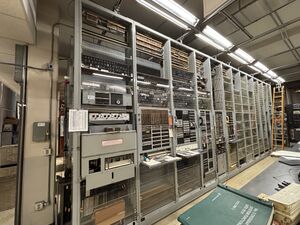CMS:Number Five Crossbar Switch

The Number Five Crossbar Switch (5XB) is from the Adams-2 exchange on Mercer Island. Its configuration in the museum is around one fourth of its original size. It is one of two known 5XB's to exist in the present day.
In Active Service
The switch was cut over in 1958 to relieve the Parkway exchange of the Mercer Island traffic that was previously handled there via underwater cable. Along with the cutover of the machine, switchman Don Fagerholm, a long-time resident of Mercer Island, transferred from the Parkway central office, to the new Adams office on the island. He stayed with the switch for much of its life, including its retirement. He was still on staff at Adams after the 5XB was replaced by a 1ESS in the 1980s.
Museum Life
The Telephone Pioneers selected this exchange as a likely candidate for the museum, and after permission was given to transfer it to Duwamish, Don Fagerholm selected the frames to take, and supervised the early installation of the switch in the museum. Volunteer Bob Dickensheets also had a very significant role in installing and maintaining the switch at the museum
In addition to equipment from Mercer Island, the museum's 5XB also has frames gathered from other offices as well, including
- Completing marker 1 (CM1), a U & Y type marker that is an older design than the wirespring CM0
- A "minibar" auxiliary line link frame with mini crossbar switches
- An older style number group from the RE-2 office
- (either the ANI or LAMA frames came from not-Adams. I can't remember at the moment. Research and update)
- Revertive pulse outgoing senders (OS's) and incoming registers (IR's) from New York.
Since its basic initial installation, the 5XB has been expanded and augmented by museum volunteers in order to present a more complete view of the capabilities of the machine. In the 1990s, Steph Kerman donated the RP OS's and IRs mentioned above, allowing the switch to once again communicate with the museum's panel office. The OS's feature a novel modernized counting chain circuit on a PCB, manufactured by CMC Corporation to replace the 208 type relays and RP stepper that would have previously been used. I
n the late 2010's volunteer æstrid Smith wired up the Pretranslator (PRT) to allow the machine to translate on a varying number of dialed digits. (Before this was returned to service, a museum caller could not dial common three digit codes, like 411, 511, etc. They would have to dial a full 7 digits, like 511-1111 in order to complete their call). At the same time, æstrid and Sarah Autumn configured the machine to place calls to the C*NET collector network via kercheep using 1+7D dialing.
In 2021, volunteer Sarah Autumn fully repaired the trouble recorder, which had not been working for several years. This was a substantial addition to the switch, as the trouble recorder was one of the primary diagnostic tools used by technicians.
In 2022-2023, Sarah acquired further equipment from Steph Kerman and Steve Flocke which allowed the switch to complete coin calls, both on an Intraoffice (IAO) and intra-office basis. Steve Flocke's main contribution was the Coin Supervisory Link, which he designed and built for the museum.
In 2024 Sarah wired up the Automatic Monitor Register Sender Test (AMRST) equipment in the Master Test Center (MTC). This equipment allows the 5XB to monitor and test its own senders and registers for faults while in operation.